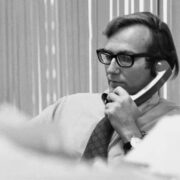SUPERMAN: Maybe the Most Progressive Hollywood Blockbuster of the 21st Century
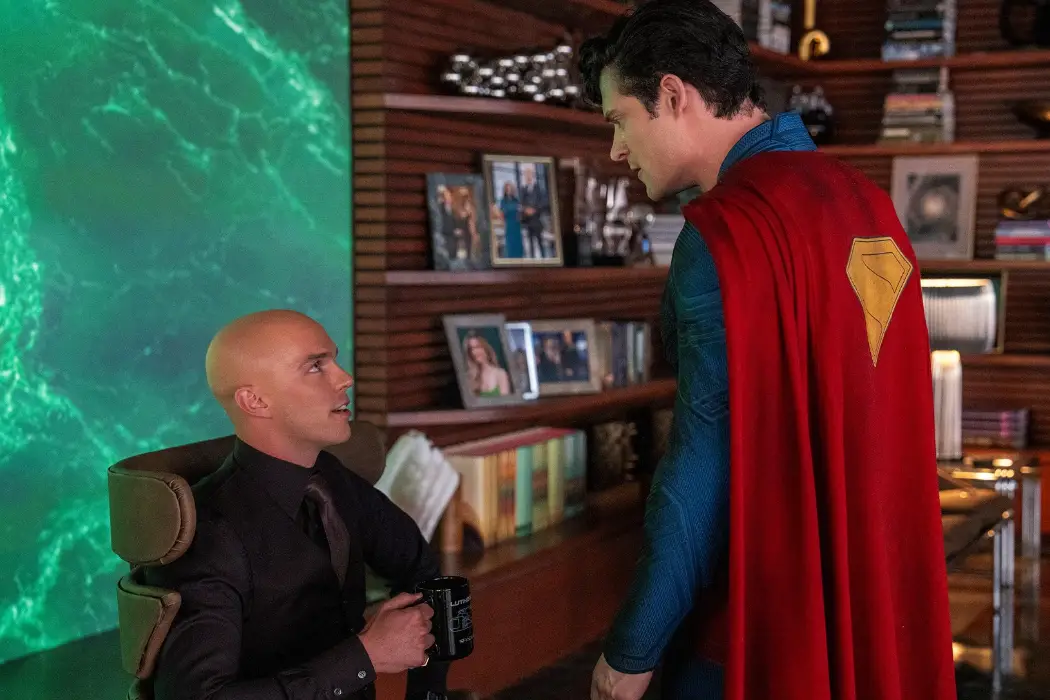
Film critic, Ithaca College and University of St Andrews graduate,…
Superman is possibly the most left-leaning blockbuster Hollywood has produced in the last 20 years. Believe me, I’m as surprised as anybody. Reimagining the Man of Steel for the modern age, writer-director James Gunn has tapped into the character’s innate goodness and wholesome aw-shucks charm, casting him as a man resolute to do the right thing, no matter the cost. That shouldn’t be that radical, but in 2025, kindness is the new punk rock.
Not quite reinventing the superhero genre but rather revving the engine and doing wheelies with it around Metropolis, Gunn’s Superman brings the director’s trademark wit and tight scripting to bear on a busy production that aims to blaze a new direction for the character while also setting up a whole new cinematic universe. It’s like watching a chef prepare a five-course dinner on a treadmill wearing rollerskates. That the film is even coherent is a spectacular feat; that it’s any good is a miracle.
Meet the New Superman
The film begins in media res, as Superman (David Corenswet) crash-lands in the Arctic after losing a fight for, we’re told, the first time. We’ve skipped the Krypton stuff, skipped the coming-of-age in Smallville — Supes is introduced as a fully fleshed-out hero, someone who’s already gone through his trials and knows that he wants to be a force of good in this world.
In Metropolis, some other unrelated guy named Clark Kent, who looks a whole lot like Superman, is a reporter working for The Daily Planet who gets a suspicious number of exclusive interviews with Superman. His girlfriend, Lois Lane (Rachel Brosnahan), knows his secret. Far from the dream team they become in most Superman stories, this Lois and Clark are in those awkward first months of their relationship, where they’re still learning things about each other and don’t yet live together, the phase when they haven’t yet told their colleagues about their affair and haven’t met each other’s parents. Clark breaks into her apartment (Maybe he has a key? It’s never explained.) and cooks her breakfast for dinner — “It’s your favorite,” he says. “No,” Lois replies, “It’s your favorite.”
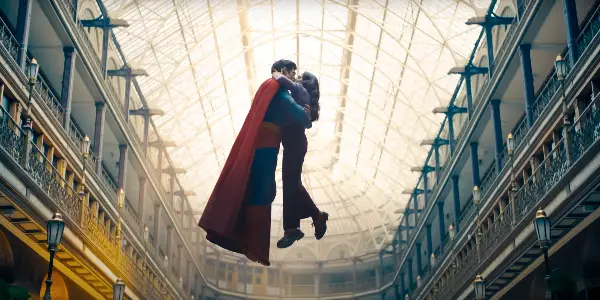
It’s a lot of fun to see these two iconic characters at a point in their lives that the films have never really explored. Their relationship fits with the broader goals of Superman as a story: We’re not seeing the first time these two meet. This is not an origin story. But there’s clearly a lot of growing to do, and Brosnahan and Corenswet play their roles cute and compelling enough to hopefully lure people back to the cinemas to see the Lois and Clark dynamic evolve over the next 10 years or so.
This Superman might have a very binary moral code and a wholesome love of waffles for dinner, but he’s not a child. At Superman’s core is that essential goodness, the desire to do the right thing that makes him an inspiration to everybody around him. He knows random Metropolis civilians by name, tries to keep his monsters alive rather than killing them, and goes out of his way to save a squirrel in the heat of battle. This is perhaps the most comic-accurate depiction of Superman, and the characterization is heavily based on the All-Star Superman run specifically — widely considered to be one of the best stories of the character, this particular comic follows Superman as he tries to do right by humanity in the week or so before he dies of solar radiation. Corenswet is effortless in his affability while also projecting that untouchable coolness that you’d expect an impervious Kryptonian to have. You can believe that, in a simpler story, he might be the best on-screen Superman yet.
Does Superman’s Story Work?
Superman’s story is quizzical in a distinctly postmodern sense — it relies on decades of culturally understood superhero lore and is designed like it knows it’s the fifth version of this character on-screen. It skips the pleasantries, dumping you right into an emotionally heavy scene and a lot of sci-fi oddities, from helper robots that heal Superman to Krypto the disobedient flying dog to the Fortress of Solitude, which emerges from the ice like it’s always been there. While much of this I’ve absorbed via cultural osmosis over many years of reading and reporting on pop culture — I have a vague understanding of Krypto as a comic book character and know the Fortress of Solitude by name, though I have never known Superman to have deadpanning helper robots.
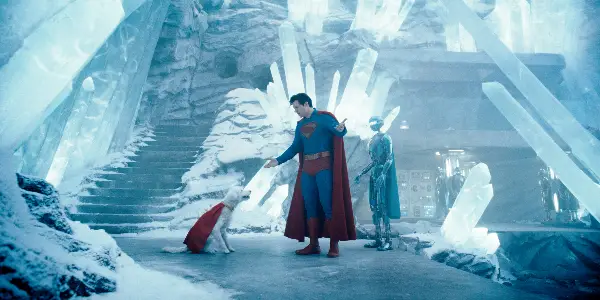
Gunn casually throws in a level of baseline weirdness — never explaining Kryptonite, for instance, or what a Green Lantern is — so that he can get to the really, really out-there stuff, like the fact that Lex Luthor (Nicholas Hoult) has a pocket-dimensional prison where he banishes his political opponents and ex-girlfriends, or that Guy Gardner (the Green Lantern played by Nathan Fillion) has the dumbest haircut of all time. That intrepid, go-for-broke storytelling is pretty exhausting in practice, and it’s likely not going to help endear Superman to people who don’t watch comic book movies. But it’s a sure way to win over genre fans — and it means Gunn can develop these characters beyond their most basic roles.
Some Notes on David Corenswet and Nicholas Hoult
Hoult and Corenswet are fantastic as Lex Luthor and Superman, as instantly iconic a pairing as Heath Ledger’s Joker and Christian Bale’s Batman. They’re so perfect for each other — one an egomaniacal capitalist who wants to dominate everyone around him, the other a noble alien hero who sees the world in much simpler terms and is trying his best to make it a better place. Sort of like if Paddington Brown went toe-to-toe with Mark Zuckerberg. Paddington might not understand or be able to fix the vast socioeconomic problems that enable people like Zuckerberg to rise to power and make the world worse, but he can certainly give the old lizard-robot a hard stare for the ages.
Many audiences will probably walk out of Superman blown away by the psychopathic range Hoult displays here, and it’s certainly the most showy performance of the bunch. But I actually think Corenswet has the harder role here — it’s difficult to embody an alien who believes in goodness, empathy, and kindness, and there are moments where you can see the Superman façade slip and the messier human side of the character falter with the real-world implications of his actions. Gunn’s film also has the unenviable task of reasserting the character’s patient, friendly nature and inherent humanity after 15 years of Superman being a stone-cold murderer. I think Corenswet is wonderful, but it’s too soon to tell where he stands among the pantheon of Superman actors — his performance here is a little all over the place, as he plays a dozen different emotions at 100% intensity but without anywhere specific to point them. If the performance feels unfocused, it’s because the film is, too, with precious little time to slow down and explore this version of the Man of Steel.
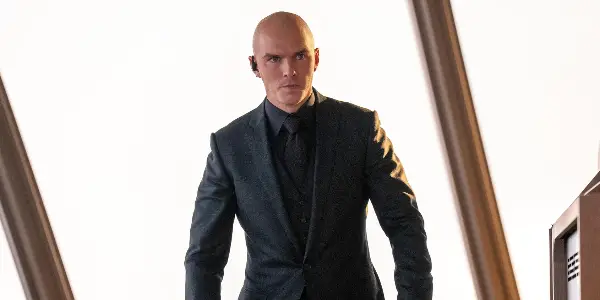
I wish the film gave more space to Superman’s dialogue with Lex Luthor in particular, to see more of how these classic foes see each other. Lex’s ultimate villain monologue, when the chips are down and he lays out why he hates Superman, happens during the climactic fight scene, when Superman is fighting for his life and Lex is shouting from his skyscraper HQ. Hoult’s performance is still incredible — both he and Corenswet auditioned for Superman, and Hoult lost the lead role but was recast as the villain. Lex is both a man who despises Superman but also secretly wants to have that power, that love — which is why casting the second-best Superman actor as the villain is a brilliant move on the part of Gunn and casting director John Papsidera. In that scene in the climax, Superman has finally gotten the upper hand, and the sheen of wealth and the nice suit can no longer disguise the fact that at Lex’s core, he’s a feral street dog lashing out at anyone he thinks poses a threat to him. Unfortunately, the witty, excellent dialogue was nearly inaudible with all the crash-bang noise of the climax going on. You can barely hear Lex, which makes his big villain monologue — and that crucial character motivation — fall completely flat. I long for the days when movies were mostly two people in a room talking. There’s a reason most critics agree that a scene where Lois interviews Clark as Superman — no fistfights, no shootouts, just two people in a room talking — is the best scene in the film.
Superman’s Leftist Politics Are So Refreshing
I claimed earlier that this film is the most left-leaning blockbuster Hollywood has produced in the last 20 years, though that’s not without its qualifiers. This new vision of Superman reflects our world and its ongoing geopolitical and social conflicts. Through Luthor, Superman shows that it understands that our world is led by an insane cabal of technocratic elite (like Elon Musk and Jeff Bezos). Luthor’s technological advances bring devastating, world-ending consequences for everyone who isn’t him, and yet he gets U.S. government contracts and runs a billion-dollar corporation.
The main international conflict in Superman feels almost ripped from the headlines, too. It’s a hodgepodge of Russia-Ukraine and Israel-Palestine — a fictional Eastern European nation funded by the West is invading a Middle Eastern nation of mostly brown people who don’t have the means to defend themselves. After so many Hollywood blockbusters that completely ignore the invasion of Ukraine or the genocide in Gaza, it’s so odd to see such a major film tackle the issues head-on. I wish I could have been in the room in the early screenings of this to Warner Bros. producers, if only to hear their murmurings of “oh, wait, this is supposed to be Gaza” and “I didn’t know we were allowed to talk about this.”
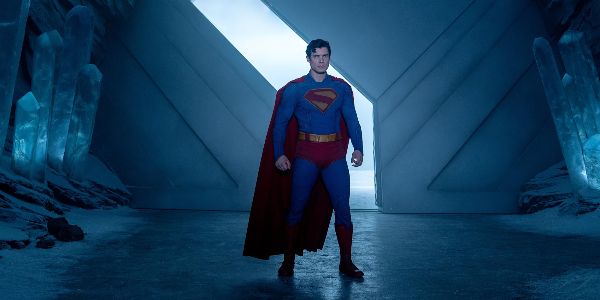
When I came out of the cinema, I felt rejuvenated but a little morose. After all, Superman is idealistic to a fault. He saves the world, yes, but Luthor also faces consequences for his actions. The Eastern European dictator plummets to his death. The not-Palestinians are saved at the last minute from certain doom. And goodness wins in the end. It feels pat at best and misguided at worst.
But even if Superman’s praxis don’t feel particularly feasible — unless you or I figure out a way to punch Elon Musk into a wormhole or slam Vladimir Putin into a building from 20 feet in the air — the film’s lessons certainly ring true. And maybe that’s what matters. Superhero movies at their best are supposed to be wish fulfillment, right? Perhaps there’s no sweeter wish in 2025 than hoping for a world where the evil see consequences for their actions, where innocent civilians aren’t slaughtered by corrupt regimes and immigrants are embraced rather than antagonized. Superman genuinely wishes the world could be a better place, and that’s a very refreshing thing for cinema in this day and age.
Aesthetics and the Larger DC Universe (*Groan*)
After watching Gunn’s disappointing Creature Commandos series on HBO Max earlier this year, I was worried he’d prove to be a one-trick pony. After all, every one of his superhero projects has been a bunch of underdogs and black sheep teaming up to save the world, usually with tragic backstories and wanton hyperviolence. But he managed to dig deep and surprise me with this film, producing a genuinely wholesome, fresh take on Superman while also launching the new DC universe as a whole.
If Superman has any major problems, they can be blamed on that emerging DC universe. Gunn, along with co-producer Peter Safran, have schemes for the next several years of DC titles, planning to do for Batman and Superman what Marvel did over a decade ago for Iron Man and Captain America. That connective tissue makes it difficult to engage with Superman as a standalone experience, as it will always wear the shackles of a larger DC universe across its ankles. The story feels conclusive but necessarily open-ended, and the final five or 10 minutes of the film wrap up this movie as much as they transparently try to set up sequels and spin-offs.

The real disappointment here is one of aesthetics. Superman would be an easy movie to recommend if it didn’t look so damned ugly. Don’t get me wrong — Corenswet, Hoult, Brosnahan, and nearly everybody else in the cast are all very beautiful performers, and I appreciate that this movie has colors and vibrancy where past DC films have had all the color palette of a burnt soufflé. But the cinematography here is functional without being artful — and in a film whose main visual trademark is the extreme closeup on a person’s face, it’s not surprising that the whole affair looks sub-par. The CGI isn’t very special, either — a sequence where Superman is fighting against a river of anti-matter looks ripped right out of The Minecraft Movie, and the decision to make Krypto a largely CG dog means that it’s hard to connect to the film’s most lovable character. I just don’t think this looks any better than your average Marvel movie, and when Superman is trying to proposition its audience to invest in a new superhero universe, aesthetically, it’s not offering anything we haven’t seen done better elsewhere.
Conclusion
While Superman is sure to please comic book fans, I don’t really expect it to light up a larger audience the way Marvel tentpoles like Iron Man or The Avengers have done. With the MCU already offering diminishing returns, are people really clamoring for another 15-year comic book universe? I hope that with the DC Universe, the supposed focus on tighter storytelling and directors with vision will gradually distinguish this experiment from Marvel’s factory-made theme park thrills. But I have my doubts.
It’s nevertheless an impressive package — Superman introduces us to six or seven different superheroes in addition to the Man of Steel and already shows a clear vision of where this universe could go next. In the web of comic book movies, it’s much closer to The Avengers or Gunn’s Guardians of the Galaxy in terms of its massive ensemble, dense comics lore, and visually busy fight scenes. But for me, the politics of the thing are more interesting than any fight scene, and I don’t think any superhero film has inspired that sort of naked intellectual awe since Black Panther seven and a half years ago. In both films, the politics are not merely subtextual — they’re thrust into the foreground, part of the fabric of the picture. For the first time in years, you can go to the cinema to see a superhero film and see something that feels an awful lot like the real world.
Superman is now playing in cinemas.
Does content like this matter to you?
Become a Member and support film journalism. Unlock access to all of Film Inquiry`s great articles. Join a community of like-minded readers who are passionate about cinema - get access to our private members Network, give back to independent filmmakers, and more.
Film critic, Ithaca College and University of St Andrews graduate, head of the "Paddington 2" fan club.













